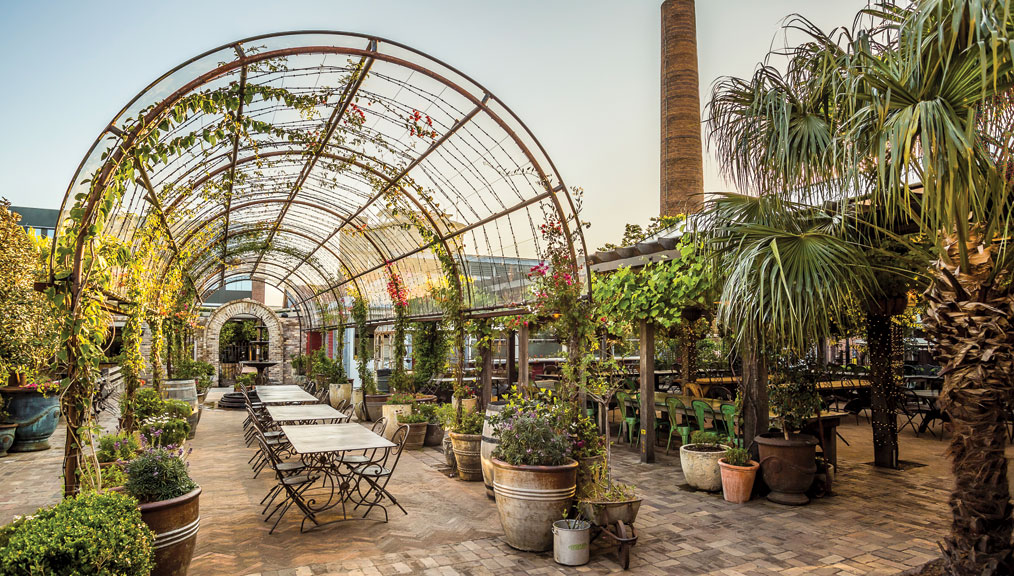[I]n an industrial suburb of Sydney, where a warehouse and parking lot used to stand, the culinary wonderland called the Grounds of Alexandria spans nearly an acre. Lush gardens pervade the property, boasting vegetables, herbs, fruits, and flowers. When you walk onto the Grounds, you may be greeted by Kevin Bacon, the pig in residence. You may see chickens, goats, and sheep—all while strolling through expertly manicured greens, sipping a latte, and pondering which eatery to visit (the venue boasts a café, restaurant, and barbecue).
But the menagerie of plants and animals isn’t to distract from bad coffee or substandard table service. It’s all part of a greater experience designed by the entrepreneurial team of Jack Hanna and Ramzey Choker. Hanna started his coffee career as a teenager, spending time training in Canada before returning to Australia and joining the competitive barista circuit. After winning the 2007 World Latte Art Championships, he decided to launch his own coffee label. He met Choker in the process, forging a friendship that later evolved into a business partnership.
The Grounds of Alexandria opened in April of 2012. The original design didn’t include animals, or even gardens for that matter. The plan was to build a mid-sized café to showcase the coffee, then wholesale to other cafés in the area. But in the midst of building the café, Choker came to Hanna with an idea. “I have a nervous shudder whenever he says, ‘I have an idea,’” says Hanna, describing his panic when Choker first told him the plan to transform the old parking area into a garden and bring in chickens. Hanna agreed, and they haven’t looked back. “It turned out honestly to be one of the best things we’ve ever done.”
Hanna says that Australian coffee culture is so robust, simply having great coffee and great food doesn’t cut when you’re trying to launch a successful business. “We wanted to provide something else. And that something else was an experience.” They took advantage of the sprawling square footage they’d acquired—a rare opportunity in the city—and began transforming the old industrial warehouse into a pastoral escape.
Guests of the Grounds can enjoy coffee roasted on site, paired with plates featuring vegetables, herbs, and fruits harvested directly from the gardens. The menu at the Potting Shed, the venue’s restaurant, features a selection of cocktails, three-course meals, and small plates. The Garden, a more casual dining area, offers fresh juices and Aussie-style barbecue, as well as pizzas baked in a clay silo.
The coffee program includes a roasting and education facility. Two twelve-kilo Probat roasters currently manage the demand for both the café and wholesale, while a warehouse nearby handles production for outside accounts. The café offers full table service, for both breakfast and lunch. A 1971 La Marzocco GS three-group, customized and reconstructed by Espresso Parts, handles drink orders for the stay side, along with a selection of Mazzer Robur and Mythos One grinders. A three-group Synchro is the workhorse of the takeaway side, where guests can order drinks to sip as they wander the property. The café also boasts a filter coffee bar. Customers can choose preparations from Oji cold-drip towers, Aeropress, Kalita Waves, and a Steampunk.


Though the Grounds started with coffee as the plan, it’s clear that the collective experience at the Grounds is just as important as the coffee itself. “We still bid on the Best of Panama auctions and we still buy direct,” Hanna says. “We still want to focus on amazing quality and amazing things that we serve—that’s just part of the bigger experience.” He says that many cafés get caught up in the minutiae of extraction and roasting, forgetting that customers want coffee that tastes great without having to wait fifteen minutes for it. “People are so focused on detail that they miss the big picture.”
The big picture is certainly forefront of mind for the team at the Grounds. A designated staff member roves the property solely to interact with guests, inquiring about their experience and providing information about the venue’s offerings. Visitors also have the opportunity to engage in educational classes offered by the Grounds, such as courses in cooking, gardening, and coffee. “Because our coffee culture is so strong in Australia, we have the most amount of domestic coffee machine sales in the world,” Hanna says. “We try and teach people how to make a great coffee at home.”
The Grounds will soon open a new café in downtown Sydney. Hanna says that rather than spending time planning, they allow their business to evolve through innovation. He says, “Great food and great coffee, ambience, and smells, and sounds—we touch upon every element to make someone’s experience here at the Grounds really unique and memorable.”
—Ellie Bradley is Fresh Cup‘s associate editor.

















